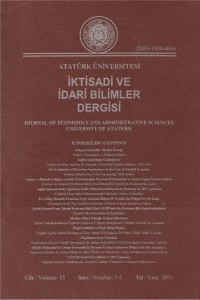Öz
Bu makale Ricardo Epitliôi ıeorisinin kalkynan bir ülke olan Türkiye için i 960-1994 dönemi içiu geçerIiliôini analiz eder. Ricardo Epitlibi teorisi borçlanman)'n sadece vergiyi ertelediainİ ileri süreL Verginin zaınanlamasyny kipinin hayatboyu bütçe kys)'l1aınasyny erkileyemiyece6inden bireyin tüketim karaı)/ny da etkilemeyecektiL Rasyonel ekonomik birimler bugünün borçlanmasyıı)' yarynyn vergilendirilmesi olarak görürler. Uygulamalar ve tahminler TiJrkiye için Ricardo Epitlioinin geçersizlioini ortaya koyuyor. Rjcardo Epitliôinin reddedjlmesi "cro'Nding-out" etkisinin varlyôynyn bir iparetidiL
Kaynakça
- -
Öz
The reason and consequences of increasing government defıcits have received a lot of attention in both deve10ped and less developed countries. One school ofthought, which associated with Keynes states that deficit fınanced tax cuts raise disposable income and stimuIate aggregate demand. In turn deficit lead to high real interest rates and crowds out private capital fonnation. Second school of thought states that tax payers realize that the present taxes depends only upon real government spending not only timing oftaxes. (Bernheim, 1987) Ricardian equivalence holds that it is inconsequentiaj whether a government budget defıcit is financed by debt issue or by tax increases, because under the certain conditions the affects of government purchases on aggregate demand is impervious to the mode affınancing fıscal defıcits. Equivalence will appear because economic agents will be aware of the future fıscal policies consider today's deficit fınancing as tomarfow's tax payments.
Anahtar Kelimeler
Kaynakça
- -
Ayrıntılar
| Birincil Dil | İngilizce |
|---|---|
| Bölüm | Makaleler |
| Yazarlar | |
| Yayımlanma Tarihi | 25 Kasım 2010 |
| Yayımlandığı Sayı | Yıl 2001 Cilt: 15 Sayı: 1-2 |





